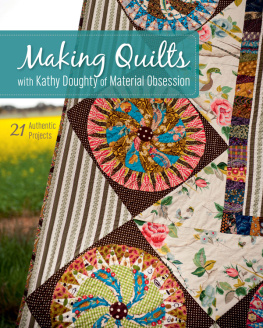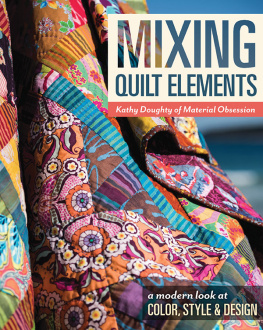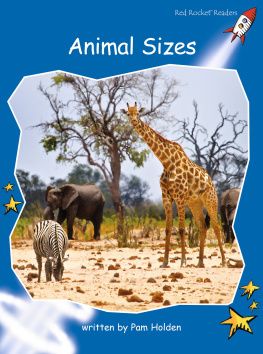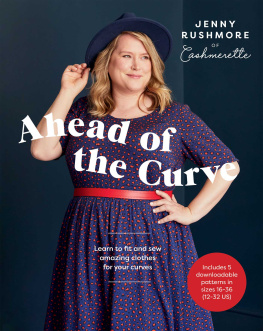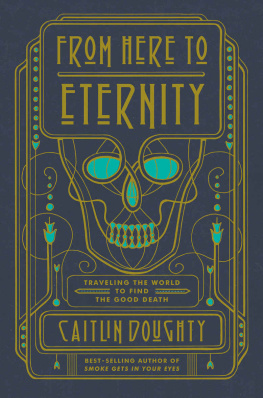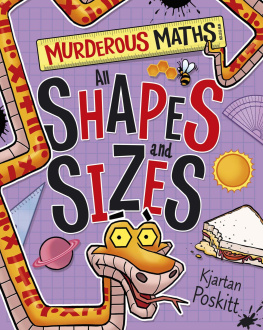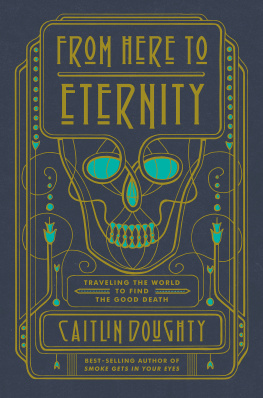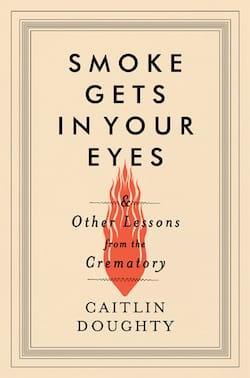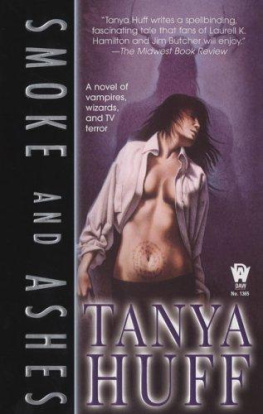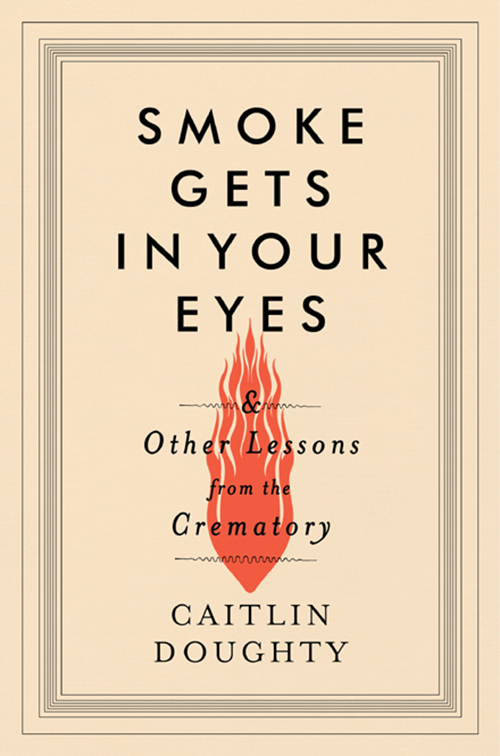
SMOKE GETS
IN YOUR
EYES
&
Other Lessons
from the
Crematory
CAITLIN DOUGHTY

W. W. Norton & Company
New York London


It takes a village to raise a death book. Is this a thing people say? It should be. If youll indulge me, there are people to whom tremendous credit is due.
The wonderful team at W. W. Norton, so good at their jobs it makes me uncomfortable. Ryan Harrington, Steve Colca, Erin Sinesky-Lovett, Elisabeth Kerr, and countless others.
Special thanks to Tom Mayer, my editor, who never coddled me and took stern issue with my adverbs. Bless you and your childrens children, Tom Mayer.
The Ross Yoon Agency, especially Anna Sproul-Latimer, who did coddle me, holding my hand like a wee babe in the woods through all parts of this process.
My parents John & Stephanie Doughty, upstanding folk who love and support their daughter even when shes chosen a life-in-death. Mom, Im probably not going to win that Oscar... so this is it.
Im loath to think of the poor-sad-no-good-pathetic thing I would be without David Forrest and Mara Zehler.
I realize this book makes it seem like I have no friends. I do, uh... promise. They are brilliant, thoughtful people all over the world who went, Youre going to be a mortician? Yeah, that makes sense.
Some of those friends were the keen eyes that read and reread this bloated beast through years of drafts: Will C White, Will Slocombe, Sarah Fornace, Alex Frankel, and Usha Herold Jenkins.
Bianca Daalder-van Iersel and Jillien Kahn, both of whom did great things to keep my brain intact and functioning. Paola Caceres, who provided the same service in mortuary school.
Lawyer-extraordinaire Evan Hess, for keeping me out of real bad things.
The members of the Order of the Good Death and the alternative death community at large, who inspire me daily to do better work.
Dodai Stewart at Jezebel, a big reason people care.
Finally, the men who ushered me into the death industry and taught me how to be an ethical, hard-working funeral director: Michael Tom, Chris Reynolds, Bruce Williams, and Jason Bruce. To be honest, it wasnt until I was out in the cold, harsh death world that I realized just how good I had it at the safe, professional, and well-run funeral home Ive called Westwind.


According to a journalists eyewitness account, Mata Hari, the famous exotic dancer turned World War I spy, refused to wear a blindfold when she was executed by a French firing squad in 1917.
Must I wear that? asked Mata Hari, turning to her lawyer, as her eyes glimpsed the blindfold.
If Madame prefers not, it makes no difference, replied the officer, hurriedly turning away.
Mata Hari was not bound and she was not blindfolded. She stood gazing steadfastly at her executioners, when the priest, the nuns, and her lawyer stepped away from her.
Looking mortality straight in the eye is no easy feat. To avoid the exercise, we choose to stay blindfolded, in the dark as to the realities of death and dying. But ignorance is not bliss, only a deeper kind of terror.
We can do our best to push death to the margins, keeping corpses behind stainless-steel doors and tucking the sick and dying in hospital rooms. So masterfully do we hide death, you would almost believe we are the first generation of immortals. But we are not. We are all going to die and we know it. As the great cultural anthropologist Ernest Becker said, The idea of death, the fear of it, haunts the human animal like nothing else. The fear of death is why we build cathedrals, have children, declare war, and watch cat videos online at three a.m. Death drives every creative and destructive impulse we have as human beings. The closer we come to understanding it, the closer we come to understanding ourselves.
This book is about my first six years working in the American funeral industry. For those who do not wish to read realistic depictions of death and dead bodies, you have stumbled onto the wrong book. Here is where you check the metaphorical blindfolds at the door. The stories are true and the people are real. Several names and details (but not the salacious ones, promise) have been changed to preserve the privacy of certain individuals and to protect the identities of the deceased.

A girl always remembers the first corpse she shaves. It is the only event in her life more awkward than her first kiss or the loss of her virginity. The hands of time will never move quite so slowly as when you are standing over the dead body of an elderly man with a pink plastic razor in your hand.
Under the glare of fluorescent lights, I looked down at poor, motionless Byron for what seemed like a solid ten minutes. That was his name, or so the toe tag hung around his foot informed me. I wasnt sure if Byron was a he (a person) or an it (a body), but it seemed like I should at least know his name for this most intimate of procedures.
Byron was (or, had been) a man in his seventies with thick white hair sprouting from his face and head. He was naked, except for the sheet I kept wrapped around his lower half to protect Im not sure what. Postmortem decency, I suppose.
His eyes, staring up into the abyss, had gone flat like deflated balloons. If a lovers eyes are a clear mountain lake, Byrons were a stagnant pond. His mouth twisted open in a silent scream.
Um, hey, uh, Mike? I called out to my new boss from the body-preparation room. So, I guess I should use, like, shaving cream or... ?
Mike walked in, pulled a can of Barbasol from a metal cabinet, and told me to watch out for nicks. We cant really do anything if you slice open his face, so be careful, huh?
Yes, be careful. Just as Id been careful all those other times I had given someone a shave. Which was never.
I put on my rubber gloves and poked at Byrons cold, stiff cheeks, running my hand over several days worth of stubble. I didnt feel anywhere near important enough to be doing this. I had grown up believing that morticians were professionals, trained experts who took care of our dead so the public didnt have to. Did Byrons family know a twenty-three-year-old with zero experience was holding a razor to their loved ones face?
I attempted to close Byrons eyes, but his wrinkled eyelids popped back up like window shades, as if he wanted to watch me perform this task. I tried again. Same result. Hey, I dont need your judgment here, Byron, I said, to no response.
It was the same with his mouth. I could push it shut, but it would stay closed only a few seconds before falling open again. No matter what I did, Byron refused to act in a manner befitting a gentleman about to get his afternoon shave. I gave up and spurted some cream on his face, clumsily spreading it around like a creepy toddler finger-painting in the Twilight Zone.
This is just a dead person, I told myself. Rotting meat, Caitlin. An animal carcass.
This was not an effective motivational technique. Byron was far more than rotting meat. He was also a noble, magical creature, like a unicorn or a griffin. He was a hybrid of something sacred and profane, stuck with me at this way station between life and eternity.
Next page



